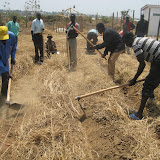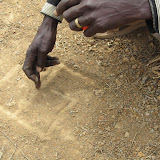As we finish our first week in Yei, we are having a catch-up day at our new home at the UMCOR guest house with the Hankins. It has been a BUSY week, as the four of us (Hankins and Hodges) have visited one to two rural churches a day in our effort to eventually visit all 17 as soon as possible. On the way, we are carefully studying the scenery, trying to identify trees, buildings and figure out what people are doing or selling as we pass to better understand the life here. The local Assistant District Superintendent, Pastor Isaac Sebit, travels with us to interpret, and patiently answers our many questions. Each community of course is a bit different, but with very similar needs, as all are in poverty, in remote areas where roads are sometimes impassable, or too far from Yei (where there are services and markets) for them to access given their mode of transportation (mostly walking, carrying things on their heads; there are some bicycles and a few motorcycles on the roads; almost all 4-wheel vehicles are owned by service organizations). The tiredness we feel at the end of the day I think will ease as we adjust to our new life. Differences in the visits are marked by which chorus of “welcome visitor” is sung by the children and by what their presentation is composed of; but more so by the things that happen on the side. There are always people at these rural locations who need a ride back to Yei for medical treatment or other purposes. One trip was especially organized to bring one of the widows of the church for a vital visit to the clinic. On another, we were stopped by someone on the road to carry a limp woman with severe anemia; there are no ambulances and this woman was too weak to ride even a motorcycle.
The purpose of the visits is to let each church met us and to have an introduction to what we hope to do. We also visit the recently dug bore holes (wells with hand pumps) with all the people and have a blessing prayer. This is the clean water for the community, and they report a reduction in disease, plus do not have to walk as far to carry water home. Each church is also used as a “Nursery School” which is preschool and Kindergarten; education which is not provided by other schools in their areas. Villages have Primary School, and students must go to Yei traveling daily or as a boarding school for High School which is one year past our high school. PTA’s and School Committees are included in the government outline for schools, but some do not have these. We heard of Nursery Schools with attendance as much as three hundred. For the most part, teachers are not paid, as parents do not have money, and the United Methodist Church (UMC) is encouraging people to plant an extra row of food for the teachers, as well as one for the pastors as they are mostly unpaid as well. Greeting visitors is of high value here, so the children form a chorus to sing a welcoming song, and sometimes process with a slow dance into the church to form a “parade”. (We are working on posting short video clips on You Tube. Also, check the photos we put on Facebook, and click on photos to enlarge and pass mouse over them for names, and note the descriptions). Several classes meet under open sided thatched church/school, with overflow under the trees. Holston Conference is providing 2 blackboards each, and UMCOR (United Methodist Committee on Relief) will bring each child a notebook, pencils, etc.
The chiefs of the area also come to our meeting (one was a woman) as well as elders of the community and church, church members, parents with babies and little ones. While it is our first visit, it is also a second or more visit from Rev. Boo Hankins (the District Superintendent provided for East Africa Annual Conference by Holston Conference, TN to help support and organize the churches) and his wife, Rev. Phyllis Hankins. We tell our story of coming here, explain how we hope to learn about their problems, and their way of life and work together for solutions. They nod at this. We also say we want to be called brother and sister, rather than the honorific “Mother” or “Father” and they clap at this. We emphasize how patience is needed to make lasting, long term solutions. Then anyone who wants to speak is invited, starting with the most honored chiefs, then the elders, the teachers, parents. It is a very inclusive, open meeting. We are welcomed warmly and given tea or simple lunch of just rice with salt, or rice with meat and sauce. The food is passed as far as it goes. They are hopeful for improvements in their situation.
We note common themes among the priority needs mentioned during the inevitable “report time”: they would like more permanent buildings to last and shelter school kids and church attenders from the rain, they would like teacher remuneration, teacher training, and teaching materials (there are no textbooks, sometimes no notebooks, etc. etc.) They want seeds, agricultural training, and implements (hoes, axes, machetes to cut the brush and small trees.) Right now during the wet season, snails are eating all the crops and children are getting sick and dying. They all ask for grinding mills as it is too far for most to take their millet to the mill; also their grinding stones break and put particles into the meal and the children get sick. Access to market is a great need (in 2007 there was an agricultural project to raise millet, sesame seeds etc. but it was too far for them to carry the grain on their heads to the market area.) The “road” to Yondoru UMC, several miles off the terribly rutted main road, had water filled holes the whole width so that even something like a hand pulled garden cart could not get through. Women are interested in selling embroidery, but again money for materials and access to market is a problem.
They report disease has been reduced since the bore holes (deep wells) have been drilled and provide them with clean water, but we did not notice pit latrines; worms were not mentioned but are a common problem. One headwoman mentioned the problem of low birth weight babies and danger to young babies and mothers. All mentioned lack of adequate medicines at area government clinics (if there are any) and difficulty accessing health care in Yei. Money for transport, fees and medicines is also an issue. Malaria is not mentioned everywhere, though not all have bed nets and mosquitos are out. People can become ill quickly and die before they can get medicine. I see that the babies are breastfeeding, but many of the little ones and a few adults have red hair, indicating lack of protein. There are orphans among the children. The most impoverished are two churches in an area where the Lord’s Resistance Army has destroyed their homes and taken everything they had. Now the military has a camp there to help protect. On the positive Boo notes that several churches last year met under trees, and this year they have thatched huts with rough log benches for church/school. They will soon all have bore holes. Some of the schools are very new. Some are more organized with PTA’s and maybe a School Committee. Some of the reports are given English!! Selfishly, it will come in very handy to have one or more English speakers in each church or village when we return to do trainings and planning.
We were impressed that people, especially the chiefs and leaders, have an in depth understanding and analysis of the problems of their village and are focused on the long-range goal of developing a better life for their children. Their group process is organized and inclusive. Women are involved, though only sometimes in leadership positions. This are all very encouraging!! The village folks we’ve met make it clear that t is of great importance to them that we are here at all; that help is coming out to try to reach them. Often it is mentioned that the different colors of our skin is not important. Diantha will hold a training Sept. 18 for the women on health and nutrition. Steve has immediately begun researching solutions to the need of reducing snails and increasing grinding mills.
A welcome song sung by the children in one church was “We are the future of Sudan.” They sang it like they believed it! This is also a common theme, that we must work for improvements for the sake of the children. The needs now are great, but these people have made it through even tougher times. The children are bright eyed, love to sing, and also bring joy to our hearts.
One of our highlights was one church where they practiced the custom of bringing a young child before the respected visitors and elders to pose a riddle (spoken in English no less). “I love my mother and my mother loves me. I strike my mother and my mother kills me. What am I?” We were given 5 minutes to come up with the answer, which of course we could not (the answer was a matchbox), so had to pay the forfeit. Fortunately we had some gum and peanuts/M&M’s in the jeep to give them as a reward for their cleverness, and Phyllis taught them a song with motions also as a reward. We’ll learn to carry treats in the future!
We are appreciative of these things: love and support from family and friends, the weather which is cooler than Tennessee, with less humidity and more breeze (high has been 85 in the shade with some cloud cover, rain every several days), the beauty of the air, grasses, trees, sky, the rural feel of south Sudan even in Yei which is 250,000, and the people here who greet us with thanksgiving and open arms. We cannot forget the Hankins who have taken us into their home in the UMCOR Guest House, and the Landcruiser which toils under Boo’s skilled hands to bounce over bumps and down pot holes and plow through water filled holes several feet deep (I call the jeep a water buffalo) and though we have come close we have not become stuck. The mosquitoes are omnipresent at night so we shut ourselves inside from the evening to morning biting time. I call the occasional ones that slip inside the house “Mr. Lurkey” as they lurk around damp drains and clothing, but we have successfully eliminated several and have no mosquito bites yet. A small thing, yet we give thanks.
Friday, August 27, 2010
Subscribe to:
Post Comments (Atom)
















No comments:
Post a Comment